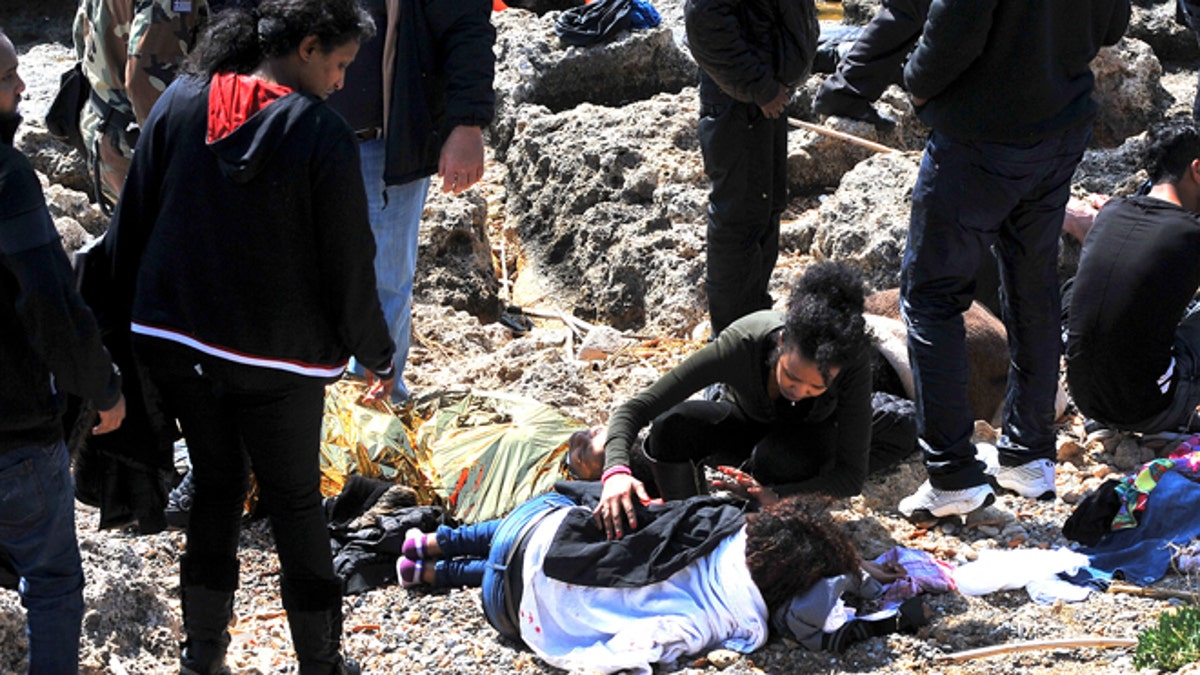
April 20, 2015 : An immigrant treats a co-traveler lying on a coast in the eastern Aegean island of Rhodes, Greece. Greek authorities said that at least three people have died, including a child, after a wooden boat carrying at least 83 migrants from the Turkish shore ran around off the island of Rhodes. (AP Photo/Nikolas Nanev)
The tragic disaster in the Mediterranean Sea that killed an estimated 800 boat people fleeing from their countries has rightly moved the world community to focus on what can be done to protect vulnerable refugees trying to escape conflicts. International leaders owe it to the victims of this heart-breaking catastrophe to fix the problems, not just react to the side effects.
The U.N. and international officials cannot simply focus on what else Western nations can do to integrate millions of people into their countries. We must collectively confront those that are creating the instability – and stop them.
The long-term solution to this growing crisis is to confront the reasons people leave their country in the first place. While migration is inevitable, the fact remains that most people leave their homes to escape violence and the certain persecution that comes from it. Today, terrorism and Islamic radicalism are a major cause of our refugee crisis.
The U.N. and international officials cannot simply focus on what else Western nations can do to integrate millions of people into their countries. We must collectively confront those that are creating the instability – and stop them.
The U.N. and other international bodies, along with wealthier nations, could manage the unavoidable migration from poorer countries if there were greater focus on stopping the larger chaos created by leaders who finance and support terrorism in the name of Islam.
The side effect of this violence and other instabilities creates the very real and immediate challenge of how to humanely deal with the millions of young men, women and children risking their lives to escape it all. The U.N.’s High Commissioner for Refugees Antonio Guterres calls it “the greatest humanitarian disaster since World War II.”
But the U.N. and leaders like Guterres must recognize the problem before it can offer solutions that will work. Otherwise, we will continue to spend millions of dollars on the effects of the real problem while ignoring a solution that could help end or dramatically alleviate the suffering. The U.N. and international officials cannot simply focus on what else Western nations can do to integrate millions of people into their countries. We must collectively confront those that are creating the instability – and stop them.
Syria is a perfect example. The deplorable Syrian refugee crisis was created because Syrian President Bashar al-Assad started a war on his people and the international community refused to confront him. Today, 200,000 people have been killed in Syria and 7.5 million people displaced. Imagine if in March 2011, the world had acted against Assad.
Kenya’s generosity also serves as a lesson and a warning sign of how dealing with just the side-effects of migration without confronting the real problem can be an unfolding and greater disaster.
In 1991, Kenya welcomed Somali refugees fleeing terrorism and war in their homeland to a UN-mandated camp consisting of mud huts and tents in North East Kenya.
In 25 years, this “temporary” refugee camp has grown to house 600,000 Somalis in what Kenyan officials today say is an Islamic radical training ground for al-Shabaab militants. Al-Shabaab has claimed responsibility for a number of terrorist attacks inside Kenya, including the Westgate Mall in Nairobi and most recently at a Kenyan university.
Kenya has recently decided it must shutdown the camp for the safety of its citizens. The UN, however, is telling Kenya it must keep the camp open to house the refugees.
Commissioner Guterres says, “Some people argue that letting in refugees and other foreigners poses a threat to our society’s way of life.” He goes on to say, “we can’t deter people fleeing for their lives. They will come. The choice we have is how well we manage their arrival, and how humanely.”
But his singular focus on managing the crisis is troubling. No one should want to manage suffering without acting to stop it. It isn’t real compassion if we aren’t committing to end it. Ignoring the actual problem is not only costly, it is inhuman.
